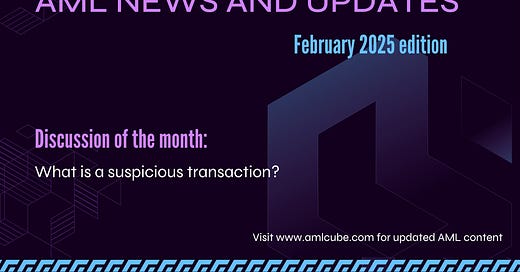What is a Suspicious Transaction? | FCE Urges UK brokers to strengthen AML efforts | BitMEX fined $100 million | Volksbank fined $20 million and more
Welcome to our AML News and Updates Newsletter - February 2025 👏
Let's see an outline of the topics to be covered in this edition:
Discussion of the month: What Is a Suspicious Transaction?
Regulatory Developments:
U.S. Supreme Court Declined to Block Corporate Transparency Act Enforcement
FCA Urges UK Brokers to Strengthen AML Efforts
3. Other News:
Greentube Alderney Limited, trading as Admiral Casino, has been fined by the Gambling Commission in the UK
BitMEX was fined $100 million for wilfully violating U.S. anti-money laundering (AML) laws
Dutch Lender Volksbank Fined for Inadequate Risk Management
KuCoin Settles for Operating Unlicensed Money Transmitting Business
Block, Inc. will pay $80 million for BSA violations
Found this publication useful?
Let’s start…
What Is a Suspicious Transaction?
If you work in financial crime compliance, you’ve likely asked yourself:
When should I consider a transaction suspicious?
It’s a question that doesn’t always have a straightforward answer. There’s no perfect formula, no single sign that definitively confirms illicit activity.
Yet, financial crime leaves patterns, and with experience you will recognize the red flags and will detect suspicious transactions with more confidence.
The Principle: Does it Make Sense?
Suspicion in AML isn’t about proving wrongdoing - it’s about identifying activity that doesn’t make sense given what you know.
Your role is to recognize when a transaction deviates from expected behavior, or aligns with known money laundering tactics.
When Should a Transaction Raise Red Flags?
Suspicious transactions typically fall into three key categories:
1. Deviation from the Customer’s Normal Behavior
Every customer has an economic profile: patterns in how they earn, spend, and transfer money. When their behavior suddenly shifts without a logical explanation, it’s worth a closer look.
A small business owner who usually deposits $10,000 per month suddenly deposits $200,000 - why?
A client who only makes domestic transactions begins wiring large sums to high-risk jurisdictions - what changed?
These deviations don’t automatically mean criminal activity, but they do require further investigation. The key question is: Does this transaction make sense based on what we know about this customer?
2. Transactions That Fit Known Money Laundering Typologies
Criminals don’t reinvent the wheel every day. They rely on tried-and-tested techniques to disguise illicit funds. Some of the most common include:
Structuring – Breaking large sums into smaller transactions to avoid detection (e.g., multiple deposits just under reporting thresholds).
Wire transfers – Moving money through multiple accounts or entities to obscure its origin.
Use of Shell Companies – Businesses with no real operations but large, unexplained transactions.
Financial Intermediaries – Lawyers, accountants that can help them identify gaps in the national laws of countries.
Trusts and other legal arrangements – to help them maintain their anonymity
and many other.
If a transaction resembles a known laundering tactic, that alone is enough to warrant further investigation.
3. Transactions That Don’t Have Economic Purpose
Some transactions simply don’t make sense. Trust your instincts—if something looks off, there’s usually a reason.
A dormant account suddenly becomes highly active with large, complex transfers.
A charity receives large wire transfers from unrelated high-risk countries.
A customer provides vague or inconsistent explanations for financial activity.
If you can’t justify a transaction through normal business reasoning, it may be suspicious.
Where Can You Find Guidance?
Regulators and other bodies have issued specific guidance on typologies in different industries. These can be used by AML professionals to identify potential red flags:
Regulatory Guidance – Agencies like FinCEN (U.S.), FCA (UK), and AUSTRAC (Australia) publish red flag indicators.
Typology Reports – FATF, the Egmont Group, and other international bodies analyze how criminals move money across borders.
Industry Networks & Best Practices – Professional forums, conferences, and peer discussions provide valuable insights into evolving threats.
The Role of Technology: Enhancing Suspicion Detection
With financial crime becoming more sophisticated, technology plays a crucial role in identifying suspicious transactions. AI-driven monitoring systems analyze vast amounts of data, detecting patterns humans might miss. Key innovations include:
Machine Learning Models: Identifying deviations from normal behavior in real-time.
Network Analysis: Mapping connections between entities to expose hidden relationships.
Automated Alerts: Prioritizing high-risk transactions for immediate review.
Blockchain analysis: Helps trace illicit funds across decentralized networks.
We are in 2025 - you cannot beat fast-paced economic crime with traditional tools! Leverage technology to mitigate your risks!
What This Means for Your Daily Work
Recognizing suspicious transactions isn’t about having all the answers—it’s about asking the right questions. Every day, you’ll encounter transactions that seem unusual. Your job is to assess them critically:
Does this transaction make sense for this customer?
Does it match a known criminal typology?
Is there a logical business reason for this activity?
If you can’t answer these questions confidently, it’s time to escalate the case for further review. Suspicion isn’t about certainty—it’s about identifying risks and taking appropriate action.
In AML, vigilance is your greatest tool. The better you understand patterns of financial crime, the stronger your ability to detect and report suspicious transactions before they enable serious criminal activity.
Artificial Intelligence and Machine Learning – These technologies help identify anomalies and suspicious behaviors by analyzing vast amounts of transaction data in real time.
Transaction Monitoring Systems – Financial institutions implement automated systems that flag unusual patterns, helping compliance teams focus on high-risk activities.
Blockchain Analytics – With the rise of cryptocurrencies, blockchain analysis tools assist in tracing illicit funds across decentralized networks.
Data Sharing and Collaboration – Cross-border information-sharing platforms allow financial institutions and regulatory bodies to exchange intelligence on emerging threats, strengthening global AML efforts.
By integrating technology into compliance frameworks, financial institutions can enhance their ability to detect and prevent illicit financial activities efficiently.
Conclusion
Detecting suspicious transactions is about recognizing patterns, applying critical analysis, and leveraging reliable intelligence. But above all, it requires professional judgement and critical thinking!
Recognizing suspicious transactions is crucial in combating financial crime.
If you're looking to help your team recognize suspicious transations, we're here to help.
Reach out for a free session to help you develop a tailored AML training program that meets your organization's unique needs.
U.S. Supreme Court Declined to Block Corporate Transparency Act Enforcement
The U.S. Supreme Court declined to block enforcement of the Corporate Transparency Act (CTA), a law requiring businesses to disclose their beneficial owners to the Treasury Department. Enforcement of the law remains suspended due to conflicting lower court rulings.
FCA Urges UK Brokers to Strengthen AML Efforts
The Financial Conduct Authority (FCA) has called on brokers in the UK to enhance their anti-money laundering controls. A recent review identified significant deficiencies, including inconsistent suspicious activity reporting and over-reliance on third-party due diligence. The FCA emphasizes the importance of robust controls to maintain market integrity.
Greentube Alderney Limited, trading as Admiral Casino, has been fined by the Gambling Commission in the UK
Greentube Alderney Limited will pay £1 million for failing to implement its social responsibility and for its insufficient anti-money laundering policies. The operator failed to properly assess customer income and vulnerability, verify customer documents, and identify suspicious activity. They also neglected to adequately scrutinize customer occupations and potential conflicts of interest, and failed to investigate potential links between accounts.
BitMEX was fined $100 million for wilfully violating U.S. anti-money laundering (AML) laws
The platform only required users to provide an email address, failing to implement proper know-your-customer (KYC) measures. Although BitMEX was prohibited from offering services to U.S. clients without an adequate AML program, its controls to prevent U.S. access were either ineffective or deliberately bypassed, allowing U.S. traders to use the platform. Senior executives knowingly allowed this activity to continue. Furthermore, BitMEX lied to banks about the nature of its operations, enabling it to process millions of dollars through the U.S. financial system without compliance.
Dutch Lender Volksbank Fined for Inadequate Risk Management
The Dutch central bank fined state-owned lender de Volksbank €20 million for inadequate risk management and failure to prevent money laundering between 2018 and 2023. Volksbank acknowledged these shortcomings and has taken measures to improve its risk management.
KuCoin Settles for Operating Unlicensed Money Transmitting Business
On January 28, 2025, KuCoin, one of the largest cryptocurrency exchanges in the world, has pleaded guilty to operating an unlicensed money-transmitting business in the U.S. and has been ordered to pay over $297 million in penalties. The platform, operated by Seychelles-based PEKEN GLOBAL LIMITED, violated U.S. anti-money laundering (AML) laws by failing to implement effective AML and Know-Your-Customer (KYC) programs, failing to report suspicious transactions, and failing to register with FinCEN.
Block, Inc. will pay $80 million for BSA violations
The company is fined by state regulators in Arkansas, California, Massachusetts, Florida, Maine, Texas, and Washington for violations of the Bank Secrecy Act (BSA) and anti-money laundering (AML) laws. Investigations revealed deficiencies in customer due diligence, suspicious activity reporting, and controls for high-risk accounts, creating risks of misuse for money laundering and terrorism financing. As part of the settlement, Block will engage an independent consultant to review its BSA/AML program and address deficiencies within 12 months.
Wondering who we are? AML Cube and its associates can assist you with:
AML Compliance
Sanctions Compliance
MiCA Regulations
Cybersecurity / DORA Compliance
In case you are interested in a free consultation, schedule a call with our team to discuss how we can help.
Best regards,
Anna Stylianou









